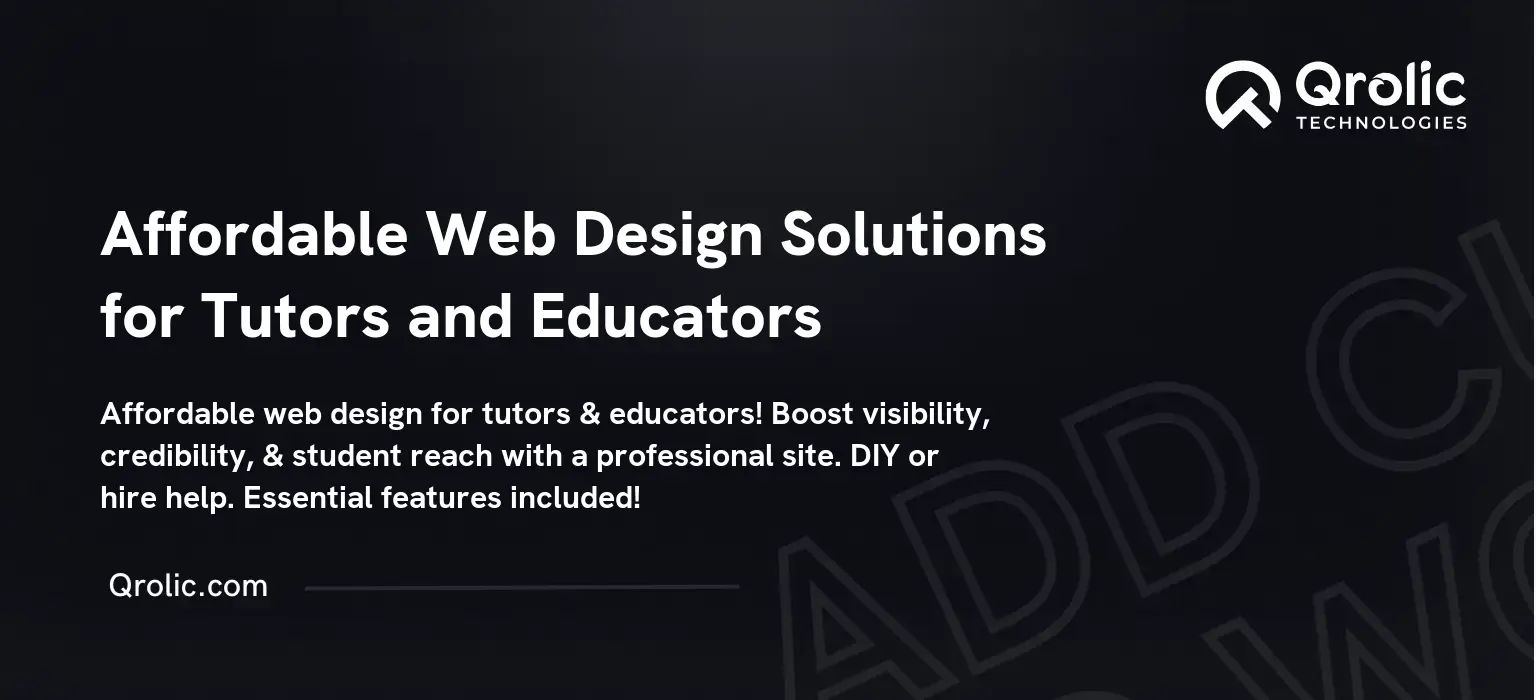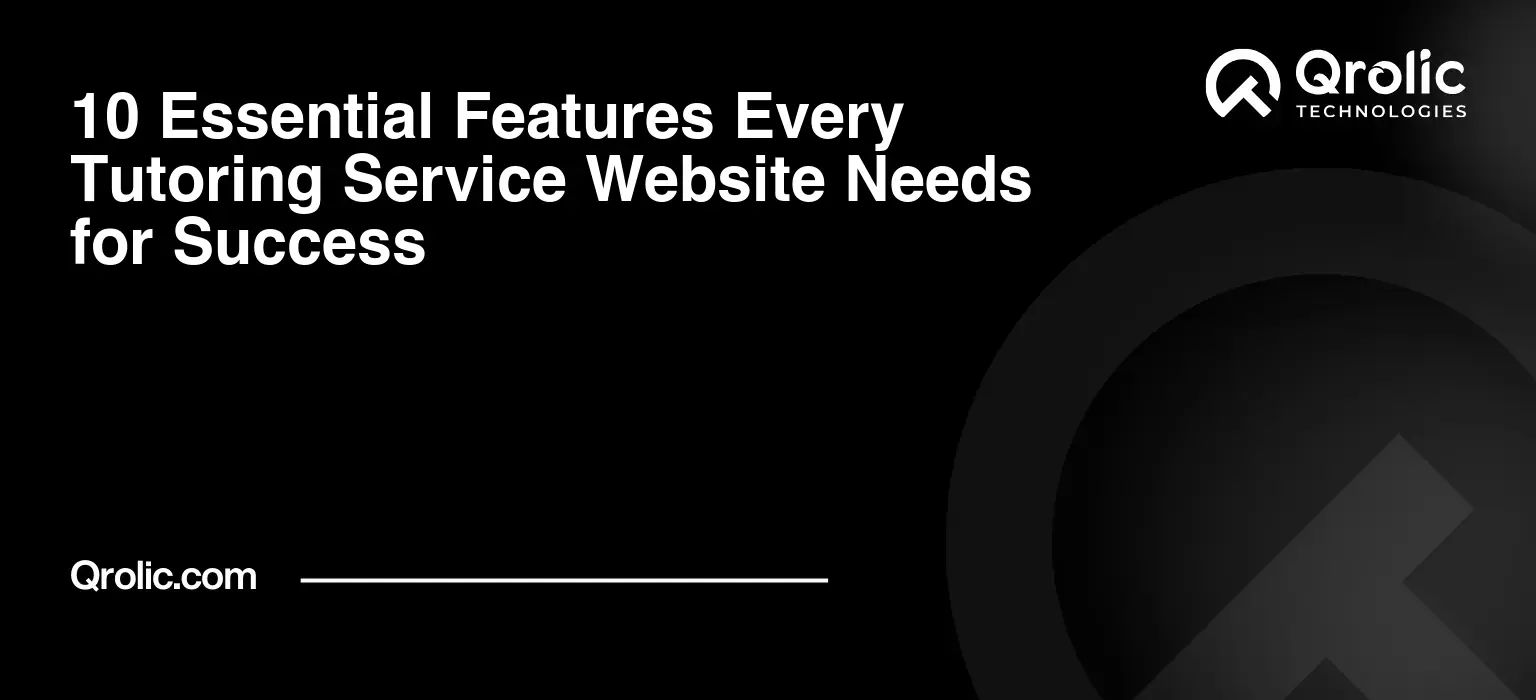Quick Summary:
- A professional website is essential for educators.
- Explore affordable web design solutions that fit your budget.
- Include key features and optimize your site for search.
- Regularly update and maintain your website for success.
Table of Contents
- The Digital Classroom: Why Every Tutor and Educator Needs a Website
- Why a Website is Non-Negotiable for Modern Educators
- Understanding the Needs of Tutors and Educators
- Tailoring Website Design to Educational Needs
- Budget-Friendly Web Design Options: Getting Started Without Breaking the Bank
- Exploring Cost-Effective Website Building Methods
- Key Considerations When Choosing Your Option
- Essential Website Features for Tutors and Educators
- Must-Have Elements for an Effective Educator Website
- Optimizing Your Website for Search Engines (SEO)
- Practical SEO Tips for Educators
- Maintaining and Updating Your Website
- Ongoing Tasks for Website Success
- Qrolic Technologies: Your Partner in Digital Transformation
- How Qrolic Technologies Can Help You
- Conclusion: Embrace the Power of a Professional Website
The Digital Classroom: Why Every Tutor and Educator Needs a Website
In today’s digital age, a website isn’t just a nice-to-have for tutors and educators; it’s an essential tool. It’s your online classroom, your digital resume, and often, the first impression potential students and parents will have of you. But why is having a website so crucial, and how can it transform your teaching practice?
Why a Website is Non-Negotiable for Modern Educators
- Increased Visibility & Reach: Imagine being able to reach students not just in your immediate vicinity, but across your city, state, or even the globe. A well-designed website acts as your 24/7 marketing tool, expanding your reach far beyond traditional methods. Think of it as your digital billboard, always working to attract new learners.
- Establish Professional Credibility: A professional-looking website instantly conveys credibility and expertise. It shows that you’re serious about your work and committed to providing high-quality education. A poorly designed website, on the other hand, can give the opposite impression. It’s about showcasing your qualifications, testimonials, and success stories in a professional manner.
- Convenient Communication Hub: Your website becomes the central hub for all your communication needs. Prospective students can easily inquire about your services, existing students can access schedules and resources, and parents can stay informed about their child’s progress. No more juggling multiple email threads or scattered messaging apps.
- Showcasing Your Unique Teaching Style: Your website offers the perfect platform to showcase your unique teaching methods, philosophy, and personality. You can share blog posts, videos, and testimonials that highlight what makes you stand out from other tutors and educators. This helps attract students who are the right fit for your approach.
- 24/7 Availability & Accessibility: Unlike physical classrooms or office hours, your website is always available. Students and parents can explore your services, access information, and even schedule appointments at their convenience. This level of accessibility is a major advantage in today’s busy world.
- Centralized Resources for Students: From homework assignments to online quizzes to useful articles and external resources, your website can act as the home for all the resources your students need. This reduces confusion and streamlines the learning process.
Understanding the Needs of Tutors and Educators
Not all websites are created equal. A website for a tutor needs to be different from a large business’s platform. So what exactly do you, as a tutor or educator, need from your web presence?
Tailoring Website Design to Educational Needs
- Clear and Concise Information: Parents and students want information quickly. They need to understand your qualifications, the subjects you teach, your teaching methods, and your availability without wading through complicated content. Clarity is key.
- Easy Navigation: The website needs to be simple to navigate, ensuring visitors can quickly find the information they need. The user experience should be smooth and intuitive, so you don’t lose potential clients.
- Booking and Scheduling Functionality: One of the biggest time-savers for educators is the ability for students to book and schedule sessions online. This feature eliminates the back-and-forth of scheduling through emails and phone calls.
- Secure Communication Channels: Privacy and security are crucial when dealing with student information. Your website needs to have secure communication channels so that both students and parents can contact you, share materials, and make payments without concern.
- Mobile Responsiveness: More people access the internet through mobile devices than ever before. Your website needs to look and function seamlessly across all devices, including smartphones and tablets.
- Content Management System (CMS): A CMS like wordpress allows you to easily update your website’s content without needing coding expertise. This ensures you can keep your information current, add new resources, and even start a blog without the need for a developer every time.
Budget-Friendly Web Design Options: Getting Started Without Breaking the Bank
You don’t need a huge budget to get a professional website. There are plenty of affordable web design options available that can help you establish your online presence without costing a fortune.
Exploring Cost-Effective Website Building Methods
- DIY Website Builders (e.g., Wix, Squarespace, Weebly): These platforms offer drag-and-drop interfaces, making it easy for anyone to create a functional website without any coding experience. They typically come with pre-designed templates, and many offer free plans, although the functionality is limited in the free version and it often has the website builder’s name included. These are good options for beginners or anyone who has a very limited budget but are generally less customizable and harder to scale as your business grows.
- WordPress.org (Self-Hosted): WordPress.org is a free, open-source CMS that provides flexibility and scalability. You can choose from a wide variety of free and premium themes and plugins to customize your website. This is a great option for those who are looking for long-term growth and more control over their website but it does come with a small learning curve and the need to pay for hosting and a domain name.
- Freelance Web Designers: Hiring a freelance web designer can be more affordable than going with a large agency, and you can also expect a more personalized approach. The cost will vary greatly depending on the designer’s experience and the complexity of the project. Be sure to request a portfolio and get quotes from multiple designers before choosing someone.
- Pre-Designed Templates: Using a pre-designed template, even within a platform like WordPress, can significantly reduce the cost of development while ensuring a professional design. Many companies sell high-quality educational templates that can be easily customized with your own content. This is an excellent option for those who want to avoid the steep cost of custom design while still achieving a clean and professional look.
Key Considerations When Choosing Your Option
- Your Technical Skills: How comfortable are you with technology? If you’re not very tech-savvy, a user-friendly platform like a DIY website builder might be a better option than a self-hosted WordPress site.
- Your Budget: What is your maximum budget? Consider not just the initial setup costs but also any ongoing costs for things like hosting, domain registration, and plugins.
- Your Time Commitment: How much time can you dedicate to building and maintaining your website? Some platforms are easier to use and quicker to set up, while others might require more time and effort.
- Scalability: How will your website grow as your teaching practice expands? Some platforms are more scalable than others, so be sure to choose an option that can accommodate your future needs.
- Customization: How much flexibility and customization do you want? Website builders offer less flexibility compared to self-hosted WordPress websites, but might be sufficient for many tutors and educators.
Essential Website Features for Tutors and Educators
A good website for educators is more than just a pretty design; it needs to be functional and provide the right experience for the end user. Here are some essential features to consider:
Must-Have Elements for an Effective Educator Website
- Homepage with a Clear Value Proposition: Your homepage should immediately convey what you do, who you serve, and why students should choose you. Include a compelling headline, a brief description of your services, and a clear call to action (e.g., “Book a Free Consultation” or “Learn More”).
- About Me/Us Page: This page should highlight your qualifications, experience, teaching philosophy, and personality. Connect with your audience on a human level to build trust. Share your story to show you’re not just an educator, but also an individual who understands their needs.
- Services/Course Page: Clearly list the subjects you teach, the levels you cater to, and the formats you offer (e.g., one-on-one tutoring, group classes, online courses). Provide details about pricing, duration, and any special offers.
- Testimonials Page: Social proof is powerful. Include testimonials from satisfied students and parents. Use real names and, if possible, include photos to add authenticity.
- Contact Page: Make it easy for potential clients to contact you. Include a contact form, your email address, phone number, and any social media links. Consider a live chat feature.
- Booking/Scheduling Page: Include a calendar where students and parents can see your availability and book sessions directly. This can significantly reduce the administrative overhead of scheduling.
- Blog/Resources Section: Share valuable insights, tips, and educational content through blog posts. This can attract new visitors and establish you as a thought leader in your field. Consider sharing articles, study guides, or other useful resources.
- Privacy Policy & Terms of Service: If you collect user information or conduct business online, be sure to have clear policies outlining how you handle user data.
- Call to Action Buttons: Every page should include clear and direct calls to action. This can be something as simple as “Contact us” or “Book a Session”. Make it easy for potential customers to take the next step.
- Search Functionality: If you have a lot of information or content, make sure there is an easily accessible search function to ensure the customer can find the information they need.
Optimizing Your Website for Search Engines (SEO)
Having a website is only the first step. To attract potential clients, your website needs to be visible in search engine results pages (SERPs). This is where search engine optimization (SEO) comes in.
Practical SEO Tips for Educators
- Keyword Research: Identify the keywords that potential students and parents are using to search for tutors and educators like you (e.g., “math tutor near me,” “online English teacher,” “SAT prep course”). Use these keywords strategically throughout your website content, including headings, page titles, and meta descriptions.
- On-Page Optimization: Optimize your website content with relevant keywords. Make sure your content is well-written, engaging, and easy to read. Use proper headings, subheadings, and bullet points to improve readability.
- Image Optimization: Use high-quality images and optimize them for the web. Reduce the image file sizes and use descriptive alt text (alternative text) that includes relevant keywords.
- Mobile Optimization: Google prioritizes mobile-friendly websites. Make sure your website is responsive and works flawlessly on all devices. Use a mobile-friendly design and test your website on different screen sizes.
- Page Speed: A slow-loading website can turn away potential clients. Optimize your website to ensure it loads quickly. This includes optimizing images, using a caching plugin, and choosing a fast hosting provider.
- Link Building: Getting other reputable websites to link to your website can improve your ranking in search results. You can start by sharing your website on social media, engaging in online communities, and reaching out to other educators or relevant blogs.
- Local SEO: If you offer in-person tutoring, optimize your website for local search. This includes adding your business address and phone number, claiming your Google My Business listing, and encouraging local reviews.
- Content Marketing: Regular blog posts that provide value to your target audience will not only help your website rank higher in search results but also establish you as an authority. Target topics that your audience is searching for.
- Schema Markup: Implement structured data markup (schema.org) to help search engines better understand your content. This can result in rich snippets in search results, making your listing more appealing.
- Regularly Monitor Your Performance: Use tools like Google Analytics and Google Search Console to track your website traffic, keyword performance, and overall SEO effectiveness. Adjust your strategy as needed based on data.
Maintaining and Updating Your Website
Your website is not a one-and-done project. It needs to be regularly maintained and updated to ensure it remains effective and relevant.
Ongoing Tasks for Website Success
- Regular Content Updates: Keep your content fresh and up-to-date. Add new blog posts, update your services, and refresh your portfolio regularly.
- Website Security: Protect your website from hackers and malware. Ensure your website software and plugins are always up-to-date and use secure passwords.
- Website Backups: Regularly back up your website so you can quickly restore it in case of an accident or security breach.
- Performance Monitoring: Continuously monitor your website’s performance and make adjustments to improve its speed, usability, and SEO.
- User Feedback: Ask for feedback from your clients to identify areas for improvement. A website is a living thing, and it should always improve to meet the needs of your audience.
- Plugin and Theme Updates: If using a CMS like WordPress, be sure to update plugins and themes regularly to maintain security and functionality. Outdated software can introduce vulnerabilities.
Qrolic Technologies: Your Partner in Digital Transformation
Looking for an expert partner to take your website and digital presence to the next level? Qrolic Technologies (https://qrolic.com/) offers a range of services tailored specifically to the needs of tutors and educators. We understand the unique challenges you face and are committed to providing cost-effective and practical solutions.
How Qrolic Technologies Can Help You
- Professional Web Design: Our team of experienced web designers can create a custom website that reflects your brand and unique teaching style. We focus on creating user-friendly, visually appealing websites that will help you attract more students.
- SEO Optimization: We specialize in optimizing websites for search engines so they will appear higher in search results. Our team uses the latest techniques and strategies to make sure you will be found.
- Content Creation: We can help you create high-quality content that will engage your audience and establish you as a leader in your field. We can assist in writing blog posts, articles, and more, helping you share valuable information and establish your expertise.
- Technical Support: We offer ongoing technical support to ensure your website runs smoothly and is always secure. You can focus on teaching, while we handle the technical side.
- Custom Features: We can add custom features like online booking systems, student management platforms, and secure communication channels. We work with your specific needs to create custom solutions for your business.
- Mobile-Friendly Design: All the websites we design are fully mobile-responsive, ensuring your students can access your services from any device.
- Affordable Solutions: We understand the budget constraints of tutors and educators, and we offer affordable packages and flexible payment options. Our goal is to provide quality service that is still accessible to educators.
By partnering with Qrolic Technologies, you gain access to a team of experts dedicated to helping you succeed in the digital landscape. We can take care of the technical complexities, allowing you to focus on what you do best: teaching and mentoring students. Check out our portfolio and contact us to discuss your project!
Conclusion: Embrace the Power of a Professional Website
In today’s competitive educational landscape, a professional website is no longer a luxury—it’s a necessity. It’s your online classroom, your marketing tool, and your 24/7 connection to students and parents. By using affordable web design options, focusing on essential features, and optimizing for search engines, you can create a website that helps you grow your teaching practice and reach more students than ever before. Whether you choose to use a simple DIY platform, or work with a team like Qrolic Technologies, make the effort to get your website up and running. It will undoubtedly be an investment in your long-term success as a tutor or educator. Remember, your online presence is an extension of you and your teaching, and it’s crucial to present the best face forward.









